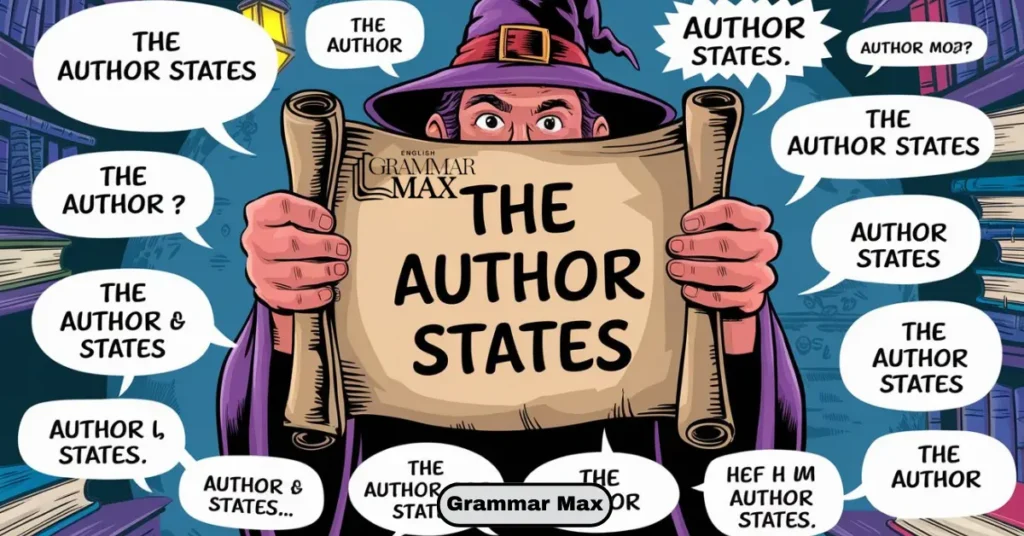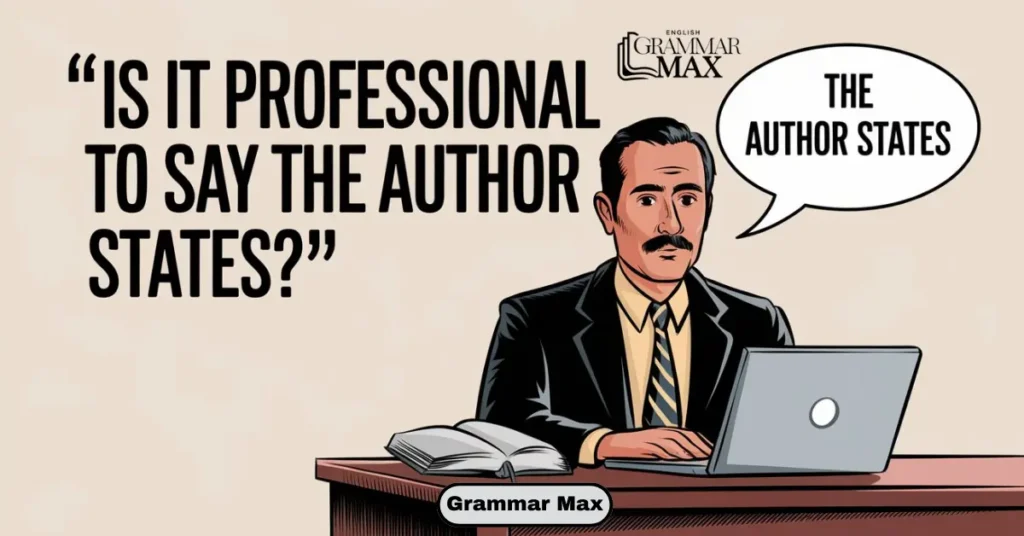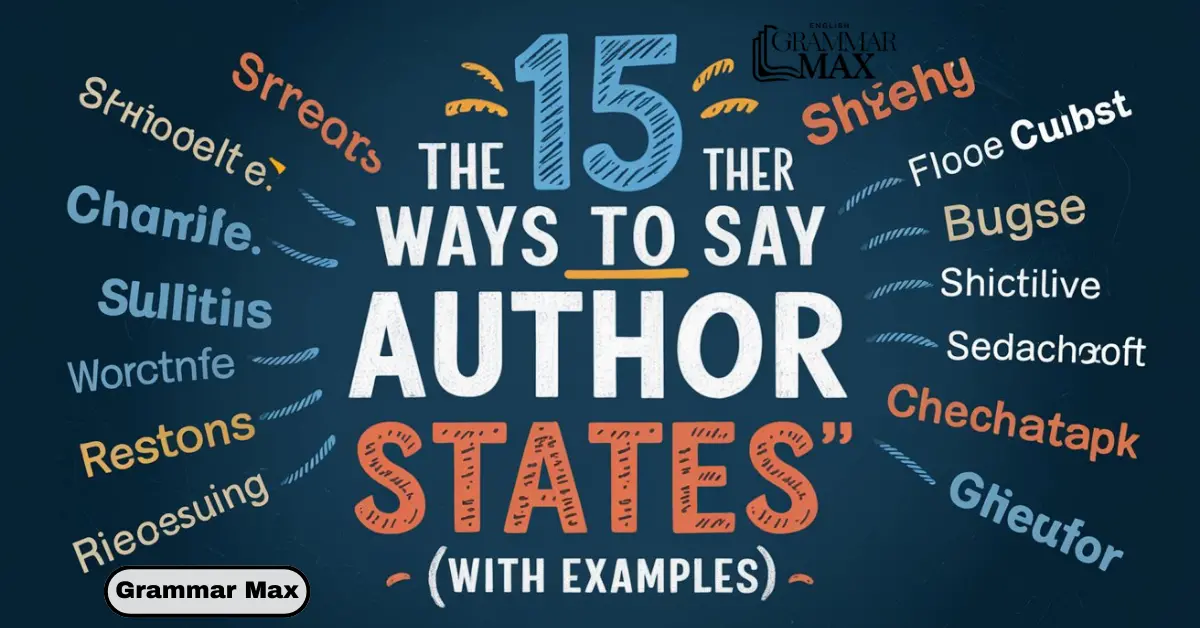The author states is a common phrase used in academic writing, research papers, and scholarly articles to introduce information or ideas from a source. However, using the same phrase repeatedly in an essay or research paper can make the writing feel monotonous. This is where finding another word for states in an essay becomes useful.
We will explore 15 other ways to say “the author states”. By using these alternatives, you’ll avoid over-repetition and create more dynamic and engaging academic papers. Each suggestion is explained with examples to show how these phrases can be used effectively in your writing.
Alternative Ways to Say “The Author States”

You can use these ways instead to say “The Author States”:
- The Author Claims
- The Author Argues
- The Author Suggests
- The Author Remarks
- The Author Asserts
- The Author Notes
- The Author Observes
- The Author Indicates
- The Author Maintains
- The Author Proposes
- The Author Highlights
- The Author Emphasizes
- The Author Affirms
- The Author Concludes
- The Author Insists
The Author Claims
The author claims is a stronger phrase, often used when the writer is presenting a belief or viewpoint. This is especially useful in scholarly writing when discussing research papers where an author presents a stance based on evidence or interpretation.
Best Use:
The Author Claims is best for presenting strong beliefs based on evidence, such as, “The author claims that early education significantly impacts future learning outcomes.”
Example:
In an email to Professor Claire, you might write:
“Dr. Smith claims that renewable energy can completely replace fossil fuels within the next 30 years.”
The Author Argues
When the author is actively defending a position or point of view, you might use the author argues. It conveys a more forceful tone, often seen in research papers that involve debates or differing perspectives.
Best Use:
The Author Argues effectively emphasizes differing perspectives, as in, “The author argues that climate change policies must prioritize sustainable energy solutions.”
Example:
If writing a research summary, you could say:
“Jones argues that passive construction weakens the impact of academic writing.”
The Author Suggests
For softer, more tentative statements, the author suggests is ideal. It implies a recommendation or idea that’s open for interpretation or discussion. This phrase is frequently found in scholarly works where hypotheses are being tested.
Best Use:
The Author Suggests introduces tentative ideas, like, “The author suggests that adopting a plant-based diet can improve overall health.”
Example:
In a literature review, you might note:
“Green suggests that using dynamic verbs improves readability in formal writing.”
The Author Remarks
The author remarks is a great way to introduce a general observation or side note. It’s useful for moments when the writer provides an interesting aside or contextual detail in academic articles.
Best Use:
The Author Remarks provides insightful observations, for example, “The author remarks on the importance of emotional intelligence in leadership.”
Example:
In an email to a colleague discussing a paper:
“Dr. Peterson remarks that the passive voice is often overused in research projects.”
The Author Asserts
The author asserts is a powerful phrase that conveys a confident and definitive statement. It works well in academic or scientific papers when an author presents their findings or conclusions with certainty.
Best Use:
The Author Asserts conveys strong conviction, as in, “The author asserts that regular exercise contributes significantly to mental well-being.”
Example:
You could write in a formal essay:
“Taylor asserts that clean energy adoption will skyrocket by 2040.”
The Author Notes
If you’re looking for a neutral, more factual tone, the author notes is a great choice. It’s commonly used in academic writing when the writer highlights an important fact or observation.
Best Use:
The Author Notes emphasizes key research points, such as, “The author notes that technology adoption varies across demographics.”
Example:
In an email summarizing a research project, you might say:
“Dr. Lee notes that the correlation between exercise and mental health is significant.”
The Author Observes
The author observes is an eloquent way to highlight an insightful or critical observation made by the writer. This phrase is often used in journal papers when a specific trend or pattern is being pointed out.
Best Use:
The Author Observes highlights critical insights, for example, “The author observes a shift in consumer behavior towards eco-friendly products.”
Example:
In a scholarly essay, you could use it like this:
“Dr. Rao observes a sharp decline in water levels over the past decade.”
The Author Indicates
When the author provides evidence or signals something significant, the author indicates is an excellent choice. This phrase emphasizes factual or data-driven points in research papers.
Best Use:
The Author Indicates presents supporting data, like, “The author indicates that increased funding for education leads to higher student success rates.”
Example:
You might write in a formal letter:
“Wilson indicates that shifting focus to green energy could save billions in environmental costs.”
Is it Professional to Say “The Author States”?

Using the phrase “the author states” is common in academic writing and scholarly works, but its professionalism can vary based on context. While it provides clarity and direct attribution to the source, overusing it may lead to repetitive and dull prose. Finding more engaging alternatives can enhance your writing’s sophistication. Additionally, using this phrase in a formal essay can help establish authority, but relying on it too heavily might detract from the overall flow and readability of the text.
Pros
- Clarity: Clearly attributes ideas to the original author.
- Authority: Establishes credibility in academic writing.
Cons
- Repetition: Overuse can make writing feel monotonous.
- Lack of Engagement: May detract from the overall flow and interest of the text.
Frequently Asked Questions
What can I say instead of the author states?
You can use phrases like the author claims, the author argues, or the author suggests to introduce the author’s ideas.
What to say instead of the author says?
Consider alternatives such as the author remarks, the author notes, or the author observes for variety in your writing.
How do you state an author?
You can state an author by using phrases like the author indicates or the author asserts to present their viewpoint or findings clearly.
What is a better way to say the text states?
Instead of saying the text states, you can use the text indicates, the text suggests, or the text emphasizes for a more engaging expression.
Conclusion
In academic writing, having a variety of ways to introduce a source’s ideas is essential for maintaining reader engagement. Whether you’re working on a research paper or a formal essay, knowing what to say instead of the author states will enhance your writing.
By using these eloquent alternatives, you’ll avoid repetition and add sophistication to your work. Remember, choosing the right states synonym for essay helps create more polished and dynamic writing.

William Henry is a writer for Grammar Max, a blog that focuses on synonyms and phrases. He loves exploring the quirks of the English language and enjoys helping readers improve their vocabulary. William’s articles are easy to read, fun, and full of useful tips for anyone looking to better understand and use English. Whether you’re a student, a professional, or just someone interested in language, William’s writing on Grammar Max makes learning about words and their meanings simple and enjoyable.
